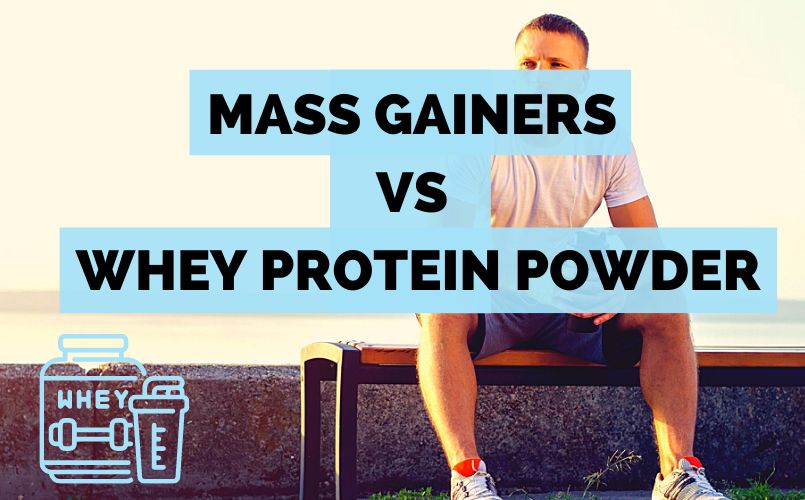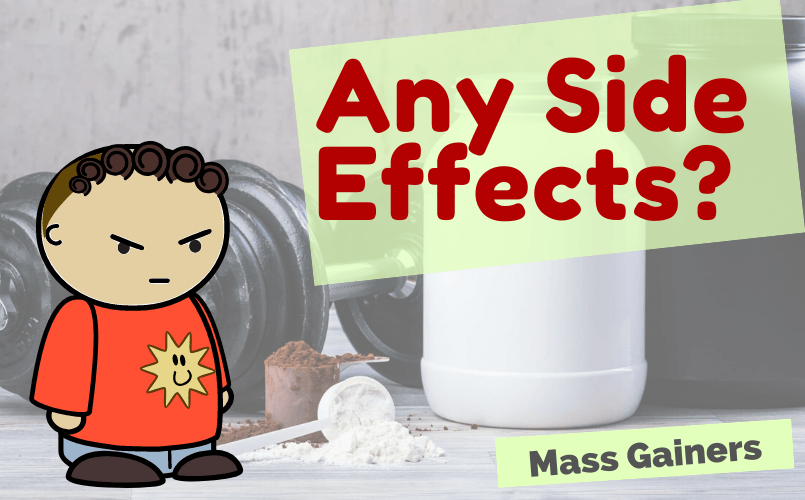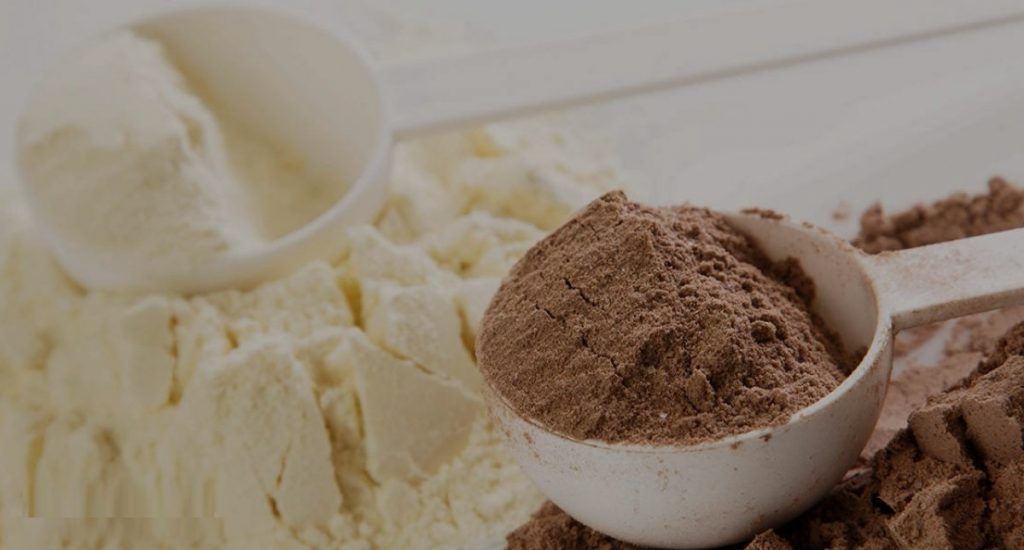Supplements are often an important means of reaching your athletic goals. But it’s even more important to choose a specific supplement that provides full support on your way towards that goal.
In my line of work, I’ve seen people waste a lot of money, time, and work for nothing because they were using the wrong supplements for what they were trying to achieve.
That’s why I decided to shed some light on the most important difference between best mass gainers and whey protein supplements. After all, I want to help you stop gaining or losing weight and muscles for no reason.
Let’s have a look at the crucial differences and see if one really is best than the other!
Table of Contents
What Is Whey Protein?
Whey protein is the purest form of protein available. It’s a by-product of processing milk and manufacturing cheese.

Because it’s a complete protein, it contains all essential amino acids and it’s rich in BCAAs.
These acids are very important as they increase muscle recovery after a workout and help stimulate protein synthesis.
A whey protein shake normally consists of a few carbs and fats.
Overall, whey proteins fall into different categories, depending on how much protein they contain:
Whey protein isolate
Whey protein concentrate
Whey protein blend
Whey protein is a supplement that can benefit any type of athlete; bodybuilders and other professionals, as well as amateurs and those who visit the gym a few times a week.
Whey protein supplement helps to increase endurance and stamina, and fuel the muscles effectively.
An efficient source of energy
Contains BCAAs
Improves protein intake
Weight Loss (boosts metabolism, suppresses appetite)
May reduce hunger
Improves fat-burning process
Promotes lean muscles
Reduces muscle recovery time
Contains lactose
Poor if any content of other nutrients (fiber, minerals, vitamins)
What Is A Mass Gainer?
A protein mass gainer, known also as a mass builder, is a supplement, designed to help people gain weight and make muscle.
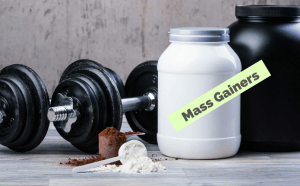
It provides your body with an extra calories, which enables you to stack up on them without any serious struggle.
These gainer powders are also very convenient to use on the go, as you can drink them at any time of the day: in the morning, between workouts, before you go to bed.
Normally, they contain creatine (but not all), which is a welcome addition if you want to increase muscle quickly.
These supplements contain different calorie amounts so that you can keep up with your calorie count and not take too much if you don’t have to.
High in carbohydrate content
Contain creatine
Increase L-glutamine intake (and increases muscle recovery)
Contain minerals, vitamins, and other nutrients
May cause stomach distress
Many contain artificial ingredients
Can cause insomnia (if they contain caffeine)
Should I Take Weight Gainer Or Whey Protein?
You can definitely benefit from both of these supplements, but choosing one over the other depends on your athletic goals.
I’d recommend choosing a gainer in these cases:
- Build muscle and body mass
- For bulking up
- For skinny guys
- Increase calorie intake
On the other hand, take whey protein if you want to:
- Build lean and athletic body
- Improve sports performance
- Work out regularly
- Want to kill fat
- Have protein deficiency
If you want to gain weight and work out regularly, take a mass gainer. If you’re trying to cut down unwanted fat, lose weight, and build pure muscle, pick whey protein.
Any Side Effects? Does Mass Gainer Make You Fat?
Generally, both of these supplements are safe to take and don’t have any side effects to worry about if you take them according to the recommended dose.
If you take too much whey protein, that can cause bloating, nausea, and even diarrhea.
They cause side effects as well when taken in excess. Since many are loaded with caffeine, they may cause insomnia and dehydration, so make sure to stay hydrated at all times.
My clients often ask me how to use mass gainer properly, once they know of its side effects.
The answer is quite simple: it is influence your weight. They can help you get bigger and gain weight but you have to combine them with an active lifestyle, regular workout, a healthy wholefood diet.
Otherwise, sitting on your couch and drinking these supplements will only result in extra weight and fat on your body, eventually leading to you being overweight.
Mass Gainer vs Whey Protein vs Creatine
Mass gainer
Mass gainers are supplements, blends of ingredients that help you mass weight and build muscles.
To mass weight, you need to eat more than your body burns and these products are very high in calories.
They’re similar to protein supplements and you can substitute these by eating more. But we all know that busy lifestyles and tight schedules don’t always enable us to eat whenever we want.
In those cases, it’s more convenient to use mass gainers.
- Practical to drink on the go
- Loaded in carbs, calories, and protein
- Provide supply of macronutrients
- Help build muscle
Whey Protein
Whey protein is a by-product of the milk and cheese industry. It contains all essential amino acids that important for proper muscle growth.
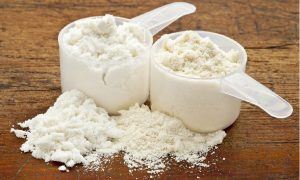
We have to get these elsewhere and whey protein contains all of them. It’s also very low in fat.
Whey protein causes anabolic reactions in our bodies; it helps them create new muscle tissue and build up muscle.
Research has shown that supplementing protein helps us increase body weight without any fat.
Some of its benefits include:
- Contains all essential amino acids
- Is absorbed quickly
- Promotes muscle growth
- Help reduce hunger
- Provides a number of other health benefits
Creatine
Creatine is a natural substance that our bodies produce in small amounts. It’s not protein and it doesn’t contain any either.
What it does is heling the body process protein more efficiently. It helps to increase certain components in the body, enabling them to process the energy we get from food.
In terms of workout, creatine helps us to make the most of it:
- It increases muscle mass
- Improves strength and performance
- Improves muscle recovery and growth
- Increases cell hydration
- Reduces protein breakdown
- Provides a number of health benefits
Frequently Asked Questions:
Can I Take Mass Gainer and Whey Protein Together?
It makes no sense to consume both of these supplements together. One of these is enough to support your body goals.
If you’re trying to gain fat, and muscles, a gainer already has enough of the right ingredients to help you achieve all that.
Whey protein normally doesn’t contain as many carbs and calories, so taking it wouldn’t really make sense. If you’re trying to mass weight, you get enough carbs and protein from a mass gainer.
If you’re trying to lose fat without getting any extra fat, it makes more sense to take whey protein without the mass gainer.
How Can a Skinny Guy Gain Weight Fast?
If you want to get mass, you need to eat more calories than you burn. If you don’t eat enough, you can’t put on weight. Here are a few tips that will help you get bigger and put on weight:
Eat more calories than you burn
Eat more meals more often
Eat foods that are high in calories (pasta, dried fruits, nuts…)
Increase protein intakeStack up on gainer and drink shakes during or after workouts
Do Mass Gainers Have Side Effects?
They cause a few side effects when taken in excess:
- Dehydration (make sure to stack up on water intake and stay hydrated even when you’re not working out)
- Diarrhea (taking too much of these supplements can cause diarrhea, especially if you’re lactose intolerant since some products stack up on whey protein from cow’s milk)
- Liver and kidney problems (taking more than the recommended dose of any mass gainer can cause these problems)
- Weight gain (taking mass gainers without a proper diet and regular exercise will result in fat gain)
Can Mass Gainers Cause Hair Loss?
Protein shakes don’t cause hair loss; in fact, there is no clinical evidence that would suggest this to be true. There may be a link between a specific ingredient in the supplement and hair loss, but most of it still has to be inspected closely for us to know how true this claim really is.
If you’re very concerned, I’d recommend you stop taking this supplement when you notice hair loss. If you continue losing your hair, it’s not the mass gainer that’s causing it.
Some people suggest there’s a relationship between hair loss and testosterone, but it’s much more complicated than thinking that bald men are loaded with that hormone.
Personally, I’ve never experienced anyone going bald while taking these supplements. I’ve seen bald men working out and I’ve seen men losing hair but there are different types of baldness, and there are many myths out there that aren’t necessarily true at all.
Is it OK to Drink Mass Gainer Everyday?
While consuming mass gainer shakes can be a convenient way to increase calorie and nutrient intake for individuals aiming to gain muscle mass, it’s essential to approach daily consumption with caution. The appropriateness of drinking mass gainer every day depends on individual nutritional needs, overall dietary habits, and specific fitness goals.
Mass gainers are formulated to provide a high-calorie blend of carbohydrates, proteins, and fats, along with additional vitamins and minerals. However, regular and excessive consumption without considering individual requirements may lead to unintended consequences. These shakes are designed to supplement a well-balanced diet, not replace it entirely.
One potential concern is the risk of consuming excess calories, which could lead to unwanted fat gain if not utilized through intense training. Furthermore, some mass gainers may contain added sugars or artificial ingredients that, when consumed daily, may have negative implications for overall health.
Individuals with specific dietary restrictions or those prone to digestive issues may also experience discomfort with daily mass gainer consumption. It’s crucial to assess the overall nutritional content of the supplement and ensure it aligns with personal dietary goals and preferences.
In summary, while occasional use of mass gainer shakes can be a valuable tool in a muscle-building regimen, daily consumption should be approached judiciously. Consulting with a nutritionist or healthcare professional to tailor the intake of mass gainers to individual needs and goals is advisable for a well-rounded and sustainable approach to muscle gain.
When Should I Switch From Weight Gainer to Whey Protein?
Switching from weight gainer to whey protein depends on your fitness goals, dietary needs, and overall nutritional strategy. Both weight gainer and whey protein serve distinct purposes in supporting muscle growth and recovery, but understanding the differences between them can help you make an informed decision.
Weight gainers are designed for individuals who struggle to consume enough calories from whole foods alone to support muscle growth and weight gain. They typically contain a blend of protein, carbohydrates, and fats, providing a high-calorie option for those looking to increase their calorie intake efficiently. Weight gainers are particularly beneficial for individuals with fast metabolisms or those with high energy expenditure, such as athletes engaging in intense training regimens.
On the other hand, whey protein is a fast-digesting protein supplement derived from milk. It is rich in essential amino acids, particularly leucine, which plays a crucial role in stimulating muscle protein synthesis. Whey protein is commonly used as a convenient and effective way to increase protein intake, enhance muscle recovery, and promote muscle growth. It is especially popular among individuals aiming to optimize their protein consumption without excess calories, making it suitable for both lean muscle gain and weight management.
The decision to switch from weight gainer to whey protein hinges on your specific fitness goals and dietary requirements. If your primary objective is to increase muscle mass and overall body weight, and you struggle to consume enough calories through whole foods alone, then a weight gainer may be beneficial, especially during bulking phases or periods of intense training. However, if you have reached your desired weight or are aiming for lean muscle gain while controlling calorie intake, transitioning to whey protein can be advantageous.
Additionally, consider your carbohydrate and fat intake when making the switch. Weight gainers often contain significant amounts of carbohydrates and fats to boost calorie content, which may not align with your nutritional needs if you are focusing on lean muscle gain or weight management. Whey protein offers a leaner alternative, providing high-quality protein without the excess calories from carbohydrates and fats, making it a more suitable option for individuals with specific dietary preferences or restrictions.
Ultimately, the timing of the switch should be based on your individual goals, preferences, and dietary considerations. Whether you opt for weight gainer or whey protein, ensure that your supplement choice complements your overall nutrition and training regimen to maximize results and support your fitness journey effectively.
Is Mass Gainer Good for Building Muscle?
Unless you’re the case of “mass multiplied = muscle” – you probably want to get rid of it. After all, it doesn’t look like a real muscle mass. We need to work to put on a real muscle mass, and even then – it doesn’t always happen. I’m not suggesting you get rid of it. But I do suggest that you develop a healthy and positive attitude about it and move on to developing a body of muscle. This type of “mass will lead to muscle” advice came from bodybuilders – and it works. But I’m betting you wouldn’t be reading about a story like this today if you ignored the advice for gaining muscle mass.
Is Mass Gainer Good for Building Lean Muscle? Mass gainer work is totally in line with current bodybuilding training. If you want lean muscle, then most likely you will need to do more volume and strength training with less rest between sets. This isn’t possible with the slow-twitch fiber-based lifting style that used to be standard among bodybuilders – and that’s okay. In reality, fast-twitch fiber-based training can lead to metabolic fatigue and even a decline in athletic performance. This is true even when using a high-intensity, short-duration work period.
Is Mass Gainer Healthy?
There’s one flaw to this “secret formula”: you have to eat several meals a day, and not every meal will have the same amount of protein in it. Remember, for people who are trying to gain weight, the idea is to lose weight in your stomach and not your muscles. As they gain weight, you want to eat fewer calories and more of the right kind.
This is one reason why it’s so important for those who are on a high-protein diet to make sure they’re eating at least two high-protein meals a day, so they’re not coming home late and only consuming fast food or dinner. They need the protein even after that. (You can also think about this logically: by increasing the protein you’re getting each meal, you’re also increasing the caloric deficit so your body can work to burn some of the excess fat you are accumulating. But, to be honest.
Are Mass Gainers Healthy?
Although there is no official American Society for Nutrition definition of the term Mass Gainers, the AAP and the U.S. Department of Health and Human Services define them as food and beverages high in protein and carbohydrates that are promoted to increase weight gain. In fact, the most effective studies (conducted at the USDA) have shown that diets that are high in protein and carbohydrates do not lead to higher body weight.
The claims made for many claims made for mass gainers, like limiting calories, are also misleading. For example, without making calorie reduction their main selling point, lean mass gainers often recommend “exercising” with mass gainers. In some instances, this is done by diluting a product with water (which reduces its protein content) or heating a product in water in a blender (which makes the carbohydrate content increase).
Is Mass Gainer Unhealthy?
I can almost see the eyebrows raising, but no worries – this is no longer a pre-existing condition. As of January 7, 2018, AHCA has removed the requirement for pre-existing conditions to be covered by health insurance and allowed people to obtain coverage through healthcare exchanges regardless of health status.
I have thought long and hard about writing this article. I have very mixed feelings. I had a colleague and friend who was just diagnosed with Crohn’s Disease. The diagnosis came shortly after he had recently started using a mass gainer. He was in his mid-30s and had been very active in sports all his life. He had previously gained roughly 50 pounds and spent the better part.
Can I Take Mass Gainer Instead of Protein?
I eat a lot of protein. I take 4 grams of whey protein for breakfast and lunch and 5 grams of whey protein for dinner, and I don’t skimp on protein. If I need more, I take 2 grams of multivitamins, which usually have 20 grams of protein in it, but sometimes I go up to 40 grams. Whey protein is also expensive, so I also make sure I take something called a mixture of whey powder, soy protein, and plant protein, or a combination of protein powder and veggies. I get that at a high-end health food store for a lot cheaper. That takes care of 300 grams of protein every day. Should I Still Take Whey Protein Powder?
It’s fine if you really like the taste of it and you eat it every day. But if you’re trying to lose body fat, taking as little as one scoop every other day, as recommended by labels, is probably OK. Is It Still a Good Idea to Take a Shot of Whey Before a Workout? There are not a lot of studies on that. A lot of people will take a shot of it, and just about everybody will fail at trying to gain muscle weight with whey.
The Final Takeaway. What To Choose: Mass Gainer Or Whey Protein?
Weight gainers and whey protein are both beneficial types of supplements that can help tremendously when you want to make lean muscles.
Unfortunately, for some people, even taking mass gainer protein might not help.
It’s important to know what you’re trying to achieve before choosing one of these over the other. Both of these supplements are equally effective if you incorporate them into your lifestyle well.
You’ll start noticing results soon, but no matter what supplement you choose, make sure of the following if you want to make a real change with your body.
These supplements aren’t magic powders that will transform you into a muscular and well-built beast if you don’t change your lifestyle. It’s very important to keep well hydrated; stack up on water and electrolytes, especially when working out.
Working out has to be a regular thing, take time for it a few times a week. And most importantly, make sure you’re eating all the right, healthy foods. If you’re trying to mass weight, keep a count of your calories also.
Overall, I’d recommend you take weight gainers if you have difficulties with gaining weight. The cause can be anything: from no time for regular meals to fast digestion.
They’re loaded on carbs and protein, which can, along with other nutrients provide your body with a lack of calories. With time, these supplements will help you keep on top of your calorie demands and provide a necessary supply on the go. What’s more, they’re more effective when you’re looking to mass weight fast.
On the other hand, if your plan is to gradually build pure muscle mass with regular exercise and a well-planned diet, whey protein is probably a better choice.
This supplement also helps to lose weight since it suppresses appetite and improves digestion. For all who don’t want to gain weight but lose it, this is definitely the best option.
